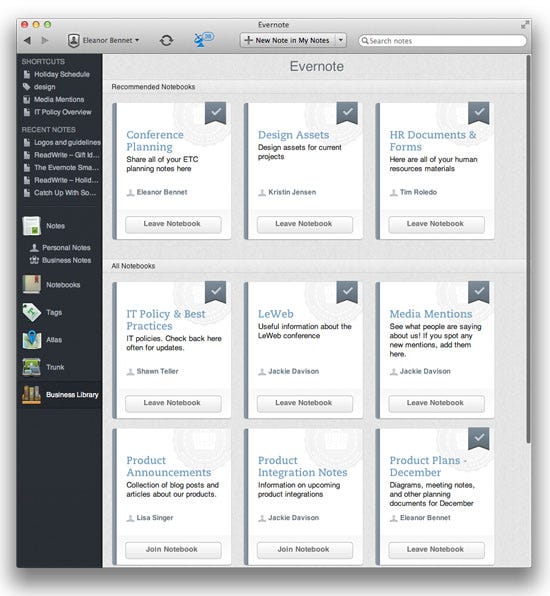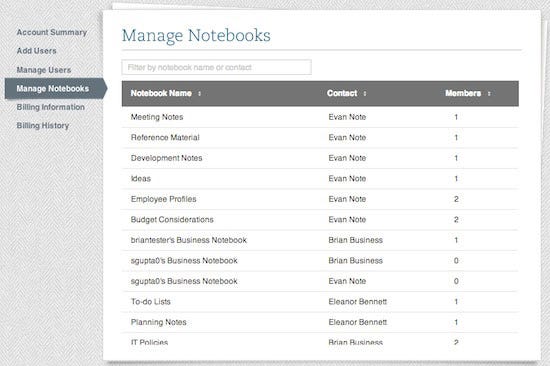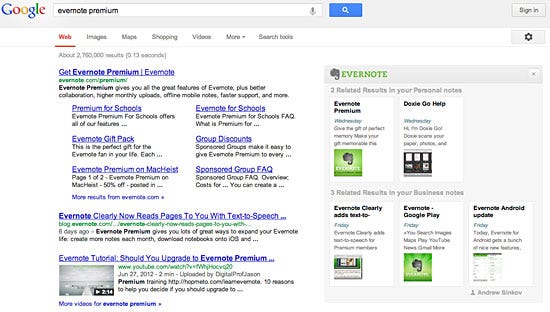Evernote For Business: End Of Butt-Ugly Software?Evernote For Business: End Of Butt-Ugly Software?
Evernote Business lets an organization deploy and manage the Evernote application on behalf of employees, extending information discoverability and sharing company-wide.
December 3, 2012

Phil Libin, CEO of Evernote, maker of the popular cloud-based personal productivity software for consumers, thinks enterprise software is "butt ugly." Evernote Business, announced Tuesday, offers a glimpse of what Libin thinks business users should expect: "beautiful experiences at work."
Evernote Business lets an organization deploy and manage the Evernote application on behalf of employees, extending information "discoverability" and sharing company-wide. The software includes Business Notebooks, collections of Evernote entries along topical lines, which can now be shared with co-workers; and the Business Library, which includes Business Notebooks and centralized administrative and company communications.
Evernote Business also adds Related Notes to the user interface. This feature digs into a company's Evernote trove, exposing information in a contextual way, depending on what the user is working on.
Administrators create the Business Library, which centralizes select information from all company users. Sharing and collaborating, Libin said, is much more natural now. "Every time you interact with Evernote, we take every opportunity to show you relevant things," he said. For example, when you search inside Evernote, it lists your notes and those shared with co-workers or stored in the Business Library.
[ Need help with your big data strategy? Read 6 Steps To Manage Big Data. ]
But it also works when you're not searching. These Related Notes come from any Notebook the user has joined. With Related Notes, when you start creating a note, it searches for related content, not just in your own notes, but across the business. In an era of information overload, Libin said, people are too bothered to search. "We're trying to find the Goldilocks moment here" -- finding just the right information at just the right time, he said.
In many ways, these new capabilities start to unlock the potential of an application like Evernote. Although Libin isn't particularly fond of characterizing Evernote Business as a wiki platform for SMBs, it's starting to feel like one, at least for those who think of wikis as a way to share and discover knowledge. What makes Evernote enticing here is that it's more of a serendipitous discovery than a forced organization of information.

Evernote
Here's a sample end-user view in Evernote Business, which does not resemble many wiki tools.With wiki software, Libin said, users must explicitly use them -- that is, launch them, login and enter data in a company-defined scheme -- when they want to share information, whereas with Evernote that sharing happens as part of the experience. For example, if you've created an Evernote entry about a recent business trip related to a project, when another user creates an Evernote entry about that project, those entries are automatically linked. "We stand with the end user, Libin said. "We don't make enterprise software. We make software for people. We take the interest of the end user first, including parts of your life."
Evernote Business, priced at $10 per user per month, includes a Web-based administrative application that can be called from the Evernote desktop app. Employees already using the free version of Evernote get upgraded to a more premium version automatically. Evernote has also beefed up its support for business customers, who now get to talk live with a support person.
Evernote Business with just the basic features will ship on all major platforms (Mac, iOS, Android, Windows desktop) starting Tuesday. The serendipitous discovery feature will initially be available only on the Mac, then on the iPhone, iPad, Android and Windows next year.
A Web Clipper capability (described below), which brings Evernote Notes to a Google search, will be available only on Google Chrome at launch, but Libin says it will soon be available on Firefox, followed by Safari and Internet Explorer. Evernote is a free, Web-based service that lets users create and organize free-form notes. It has applications for all major desktop and mobile platforms. The company says more than 45 million people use Evernote, to house and organize a variety of unstructured content.
Evernote also creates Web Clippers for all of the major desktop browsers, so users can send Web pages directly into Evernote with a mouse click. Each user gets an Evernote email address, so you can send emails directly into Evernote as well. Evernote supports documents, lets users create voice notes and even tags entries with location.
Evernote also has a set of APIs, which about 20,000 developers tap to extend its capabilities and integration. Evernote's Trunk service provides access to many of those applications, which include news feeds, Skitch files (Evernote acquired this screen capture and augmentation tool), expense filing apps, a food and recipe app (called Evernote Food) and much more.
Today's personal Evernote also has a premium version, which costs $5 per month or $45 per year. One key feature of the premium version is that it lets Evernote users share information with one another. For instance, I use Evernote to plan various content projects for our websites and video shows, and I share those project notebooks with other users so that we have the same information. In fact, we collaborate on that data -- like any shared Web-based document, it allows for co-authorship, but not in real time, as with Google Docs.
The premium version of Evernote also gets you 1 GB of content upload each month (vs 60 MB for the free version), and allows note sizes of up to 100 MB (vs 25 MB in the free version). It includes offline notebook access, indexed and searchable PDF files.
How Evernote Business Works
But here's an extremely important point, especially in this age of BYOD: If you've already got a personal account, that information stays personal even if your company starts using Evernote Business. That is, there's no opportunity for an organization running Evernote Business to get at your personal, unshared documents. As a user, you can still choose to share that information, but you can also create a Business Notebook. This is simply a designation that the notebook is related to work. You still must explicitly share them with co-workers (one by one), and then those co-workers can view and edit and search those Notebooks. Publishing the Business Notebook in the Business Library makes it available to the entire company.

Manage Notebooks
You decide which notebooks to share with colleagues."We have a strong point of view on how the product is supposed to be used," Libin said. Evernote Business is for fast-growing companies, he added. "If they say you can't make personal notes on company time, then they shouldn't be using it," he said.
Back to the Related Notes feature, Evernote isn't just matching tags and keywords, Libin said. The Evernote data team has been working on machine learning for years. The system uses semantic analysis to understand what's in the notes. He gave an example where he was typing in "ABQ," which happens to be the Albuquerque airport code, which created an association with the TV show Breaking Bad, which is filmed and set in that city. This wasn't a literal text string match, he said, but a true association the system made.
This capability even works outside of Evernote. For those who use Evernote Clipper in a Web browser (available for now only in the Chrome browser), upon performing a Google search, the user is presented with a list of relevant Evernote entries on the right-hand side of the Google Results page, including those from team members. See the view below:

Google Evernote Search
Here's what you see when Google searches meet relevant Evernote material.Down the road, Libin would like to extend Evernote's reach into other sources of enterprise information. SharePoint, for example, seems like a good target. Evernote will likely expect third-party developers to create some of those meaningful integrations, but given how entrenched SharePoint is, it might be wise for Evernote to do some of the early work here. After all, this is a case of Evernote crashing the enterprise party, even if it's bringing the coolest party favors.
Libin's prediction: "We're seeing the last couple of years of ugly business software." The technology people have gotten used to in their personal lives has set high expectations, he said, but when "they show up to work, everything's kind of crappy."
Business-class applications, he added, should offer better experiences.
That, he said, is where the money is.
About the Author
You May Also Like






